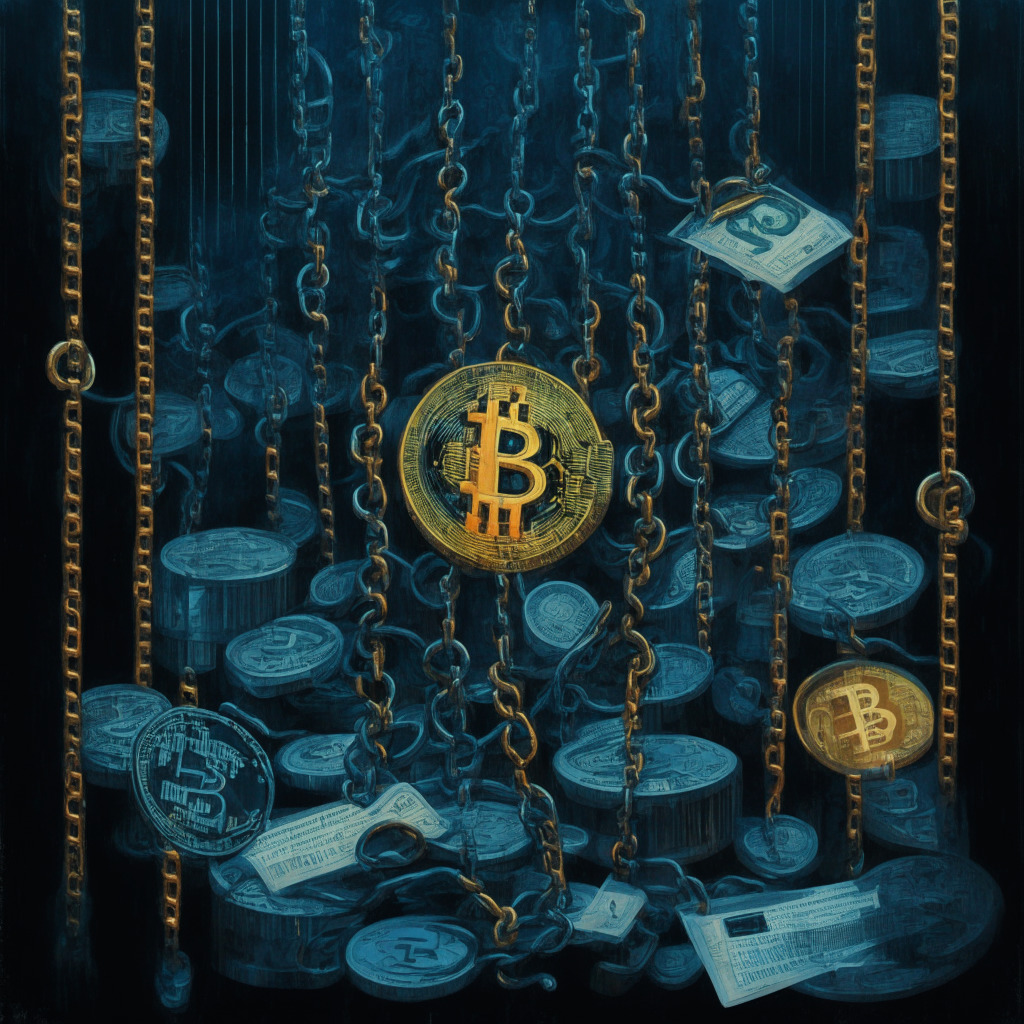“In a recent breakthrough, NTT Docomo and crypto exchange Monex announced a strategic partnership to develop new asset formation services, aiming to expand individual wealth formation in Japan. The alliance shows Monex’s increasing footprint in the crypto world, indicating potential domestic and international expansion.”
Search Results for: National
Surging Into Crypto: South Korea’s New Approach to Combatting Insolvency Cases
South Korea’s financial watchdog, Korea Deposit Insurance Corporation (KDIC), has seized virtual assets in insolvency cases, marking their first crypto crackdown. The shift follows regulatory amendments that demand local crypto exchanges to link customer wallets to domestic bank accounts, eliminating anonymous trading while empowering agencies to tackle insolvency. Increased crypto asset seizure is predicted amidst arguments over Korea’s increasingly restrictive crypto policies.
Unveiling the Dark Side of Central Bank Digital Currencies: Is the Trade-off Worth It?
“CBDCs, digital currencies issued by central banks, could pose data privacy threats due to their non-anonymous nature and extensive record of financial transactions. They also might alter our legal relationship with money, potentially leading to spending restrictions, transfer limits, or transaction blocks.”
South Korea’s Central Bank Tests Ground for Potential Wholesale CBDC Implementation: Progress or Peril?
South Korea’s central bank is collaborating with the Bank for International Settlements for a test run on wholesale central bank digital currencies (CBDCs) seeking to assess the feasibility of setting South Korea’s future monetary framework based on CBDCs. The test project focuses on the CBDC’s efficiency as a settlement asset and its programmability potential.
Global Crypto Investment: A Path to Improved Living or Regulatory Nightmare?
Crypto users worldwide are increasingly investing in digital currencies in hopes of improving their lifestyle. Survey results indicate varying motivations across different demographics and locations: from funding children’s education to defying trading bans using VPN services. However, tightening regulations and price depreciation have caused a stagnation in some areas. Despite these hurdles, an optimistic outlook remains, as digital assets continue to present a potentially profitable avenue for individual investors.
Kraken’s Acquisition of Dutch Crypto Exchange: A Strategic Masterstroke or a Risky Gamble?
“The US-based exchange Kraken plans to acquire Dutch cryptocurrency exchange Coin Meester B.V. (BCM), aiming for European expansion and leveraging the EU’s MiCA regulatory framework. This ambitious move, though promising high cryptocurrency adoption, may lead to greater regulatory scrutiny and operational complexities.”
Escalating Crypto Frauds vs. Implementation of Digital Currencies: A Tale of Contrasts
“The exploiter’s actions raise alarms for cryptocurrency security, while concurrently Argentina considers adopting digital currencies to stabilize national economies. This double-edged nature of the crypto-economy showcases security threats and promising solutions coexisting in the volatile yet dynamic world of cryptocurrency.”
Argentina’s Economic Reformation: The Pros and Cons of Central Bank Digital Currency Adoption
Argentina’s economic committee is exploring the integration of Central Bank Digital Currencies (CBDCs) as a solution to the country’s economic problems. The digital peso can provide transparency, improve taxation and potentially bring stability to the economy. CBDC’s potential to reform the financial ecosystem is currently a major topic of discourse.
Marathon Digital’s Stellar Performance: Navigating the Volatile Crypto Market Successfully
“Marathon Digital has boosted its monthly Bitcoin production rate by 20%, resulting in a rise in its share prices. The Bitcoin miner produced 1,242 BTC in September, marking a 16% growth from August and a massive 245% increase year-over-year. This productivity surge is attributed to improved operations domestically and internationally and a decrease in curtailment activities in Texas.”
Hong Kong’s Synapse Program: Automation Innovation or Vulnerability Invitation in the Crypto Sphere?
“Synapse, an augmented version of HKEX’s Stock Connect program, introduces smart contracts for improved operational efficiency in equities settlement. The initiative offers enhanced real-time visibility and scalability, underlining HKEX’s commitment to capital markets’ efficacy. However, it raises questions about reliance on technology and the potential security risks it might bring.”
Navigating Bitcoin’s Tides: Marathon’s Mining Surge, Kraken’s BTC Inflow, and Uzbekistan’s Crypto Regulations
Marathon Digital Holdings exhibited a 16% surge in Bitcoin production in September 2023. However, Uzbekistan introduced stringent regulations on crypto mining, potentially limiting industry growth. Meanwhile, U.S. based crypto exchange, Kraken, recorded its highest Bitcoin deposit activity, possibly indicating future price increases.
South Korea’s Journey to a Central Bank Digital Currency: Anticipation, Advancement and Ambiguity
The South Korean central bank, BOK, is advancing towards a Central Bank Digital Currency (CBDC) pilot, scheduled for late 2024. By testing a wholesale CBDC model first, it aims to streamline inter-bank settlements while preparing for retail use. The bank collaborates with domestic institutions and international bodies like the BIS, though it remains undecided on fully endorsing a digital won.
Assessing Blockchain Impact on Financial Inclusion: Stellar, PwC Framework and Challenging Skepticism
The Stellar Development Foundation and PricewaterhouseCoopers (PwC) have launched a financial inclusion framework to assess the effectiveness of blockchain projects in emerging markets. They found that blockchain-based payments enhance accessibility, reduce transaction costs, and increase transaction speed, notably in financially underserved areas. However, they stress on the importance of responsible design principles and robust governance to mitigate potential challenges and criticism.
Crypto Controversies: Tron, Ethereum, and Alleged Links to CCP Criminal Activities
“Yesterday, allegations emerged suggesting connections between cryptocurrencies Tron and Ethereum, criminal activities, and the Chinese Communist Party (CCP). This has led to escalating concerns about crypto market integrity. It could potentially lead to tighter regulations, impacting investors and the industry.”
Blockchain Meets Traditional Finance: A Tale of Progress and Caution from Hong Kong Stock Exchange
The Hong Kong Stock Exchange (HKEX) is integrating blockchain technology via a new platform, “Synapse,” using smart contracts to enhance operational efficiency in financial markets. However, the growing adoption of blockchain also highlights the urgent need for robust security measures and stronger oversight due to risks such as fraud.
From Crypto Mansions to Farmland: Post-Collapse Reality, and the Shaky Ground of Blockchain Ethics
“Once a beacon of success, Three Arrows Capital (3AC) spiraled into bankruptcy due to failed leveraged bets. Amid skepticism around market practices, the trial of Sam Bankman-Fried, former FTX CEO, stands alarming. The downfall of such market players triggers necessary reflections on accountability, ethical conduct, and the idea of decentralized markets in the crypto world.”
Uzbekistan’s Crypto Mining Revolution: Regulatory Safety Net or Growth Barrier?
Uzbekistan’s National Agency for Advanced Projects (NAAP) released new regulations for cryptocurrency mining, permitting only legal entities to mine using solar photovoltaic stations. These rules aim to provide transparency and predictability, while discouraging unlicensed mining activities, ensuring system safety and reliability, and permitting legal miners to trade on licensed crypto exchanges.
Exploring the Impact and Probable Consequences of Project Atlas on Crypto Tracking
“Project Atlas, launched by the Bank for International Settlements (BIS) and four European central banks, aims to revolutionize financial authorities’ management of crypto assets by tracking global asset movements. It melds data from crypto exchanges with data from public blockchains, providing tools for accurate assessment of crypto markets’ economic significance.”
Unraveling the XRP Conundrum: Court Wins, Regulatory Success, and Investor Dilemma
“In the financial market fluctuations, XRP’s recent price movements have caught attention. A U.S. Judge’s favorable decision caused a price surge, but a decrease afterwards hinted at potential lack of investor confidence. Additionally, Ripple’s Asia Pacific subsidiary now has a Major Payment Institution license for digital payment tokens in Singapore, contributing to further operational expansion.”
Navigating the Dichotomy of Blockchain’s Future: Innovation vs Regulation
“Yield Protocol’s decision to cease operations, impacted by decreased demand and strict regulations, juxtaposes with Wirex’s launch of W-Pay, a bridge for decentralized applications and traditional payment infrastructures. The future of blockchain remains uncertain amid these contrasting developments.”
Central Banks and Blockchain: A New Monetary Order or a Balancing Act?
Denis Beau, the first deputy governor of Banque de France, advocates Central Bank Digital Currencies (CBDCs) as the future of the global monetary system. However, he acknowledges the potential risks of crypto technologies. He believes that CBDCs need to focus on cross-border payments and invites a partnership between public and private sectors for efficiency. Beau proposes that CBDCs follow established models from the Bank for International Settlements and International Monetary fund. Despite skepticism, project collaborations like Project Mariana indicate the ongoing exploration of CBDCs and blockchain technology.
Uzbekistan’s Crypto Construct: Mining Regulations Nurture Legitimacy, Stifle Individual Miners
Uzbekistan’s National Agency for Perspective Projects (NAPP) has issued tighter regulations for crypto mining, barring individual miners but providing legal clarity for companies. All mining must be solar-powered and have the necessary licenses. However, privacy-focused cryptos are prohibited. The future impact of these regulations on Uzbekistan’s mining industry remains uncertain.
Decentralized Lending Protocol Shutdown vs. El Salvador’s Cryptocurrency-Powered Growth: A Tale of Crypto’s Dynamic Landscape
“Yield Protocol, a decentralized lending protocol, plans to cease operations by end of 2023 due to unsustainable business demand and mounting regulatory pressures. Meanwhile, El Salvador launches renewable energy Bitcoin mining operation, Volcano Energy, exemplifying the industry’s dynamic nature.”
Assessing the Impact of AI and Blockchain Export Controls: Opportunities and Threats for the Crypto World
The European Commission is assessing export controls on AI and semiconductor technologies due to their potential risk, technologically and for human rights violations. Four focal areas for risk assessment are AI, advanced semiconductors, quantum technologies and biotechnologies, influenced by their transformative nature and potential for civil/military fusion.
Unpacking Project Atlas: A Centralized Perspective on Decentralized Markets
‘Project Atlas’, pioneered by Bank of International Settlements and various European Central banks, is developing a proof of concept system tracking on-chain and off-chain cryptocurrency transactions. The project aims to understand macroeconomic relevance of cryptocurrency markets and decentralized finance, offering transparency and potential risk mitigation.
Argentina’s Undertow: The Inflation Crisis and the Divisive Role of Digital Currencies
Argentine presidential candidate, Sergio Massa, champions the implementation of a Central Bank Digital Currency (CBDC) to tackle Argentina’s high inflation. Arguing for a financial transformation, Massa envisions digital currency as a key to economic parity. However, crypto-community remains skeptical about government-controlled digital currency, worrying about corruption and potential for tax manipulation.
Central Bank Digital Currencies: Monumental Opportunity or Fraudulent Abyss?
“The Bank of Korea initiates pilot project to design infrastructure for a central bank digital currency (CBDC), aiming to enhance cross-border payments and potentially establish a new international monetary system. However, the journey towards CBDC’s full implementation isn’t guaranteed and potential pitfalls in the unregulated crypto world can nurture high stakes and fraud risks.”
Crypto Regulation vs Innovation: DoJ Case & France’s CBDC Vision Unveil the Blockchain Dichotomy
“DoJ asserts that absence of specific US crypto regulation does not invalidate criminal charges against Sam Bankman-Fried, former FTX CEO. Existing laws against misappropriation of customer assets still apply. This situation highlights imbalances in current crypto regulations, where extant laws can yield harsh punitive consequences in new situations.”
Unleashing the Bull: Bitcoin’s Prospects Amid Rising U.S Treasury yields and Looming Economic Unrest
Recent developments in the US economy, such as rising treasury yields and national debt, suggest a bullish future for Bitcoin. Former crypto exchange CEO, Arthur Hayes, speculates this could lead to mass liquidity injections, possibly triggering a Bitcoin bull run. However, the volatile interplay between these economic factors also warrants caution.
AirBit Club Fallout: Navigating the Tightrope Between Regulation and Innovation in Crypto
This article discusses the infamous AirBit Club Ponzi scheme that swindled investors out of their funds through misuse of crypto technology. It underscores the need for comprehensive international blockchain regulations without stifling the decentralizing benefits of this revolutionary technology.
Former FTX CEO’s Trial: Uncertainty, Trust Issues and Prospects for Crypto Exchanges
“The trial of former FTX CEO, Sam Bankman-Fried, sparks international debate on cryptocurrency future and regulation. With trust in innovation shaken, the crypto community is balancing between transparency and trust, contemplating the future of crypto exchanges post-FTX’s collapse.”
Crypto Regulation Variance: SEC vs Coinbase and Argentina’s Proposed Digital Currency
“The SEC and Coinbase are in court, debating securities registration for crypto assets. Meanwhile, Argentina’s presidential candidates propose differing cryptocurrency solutions to economic issues: introducing a digital currency or supporting Bitcoin and abolishing the central bank.”






























